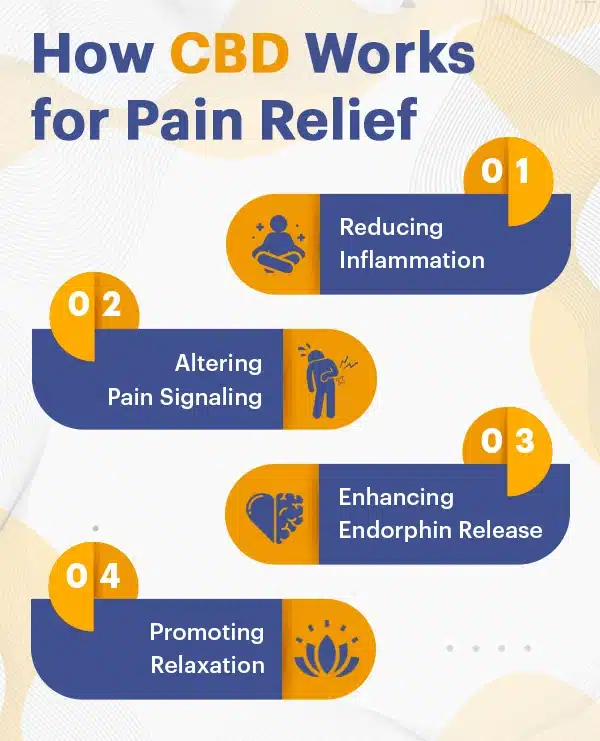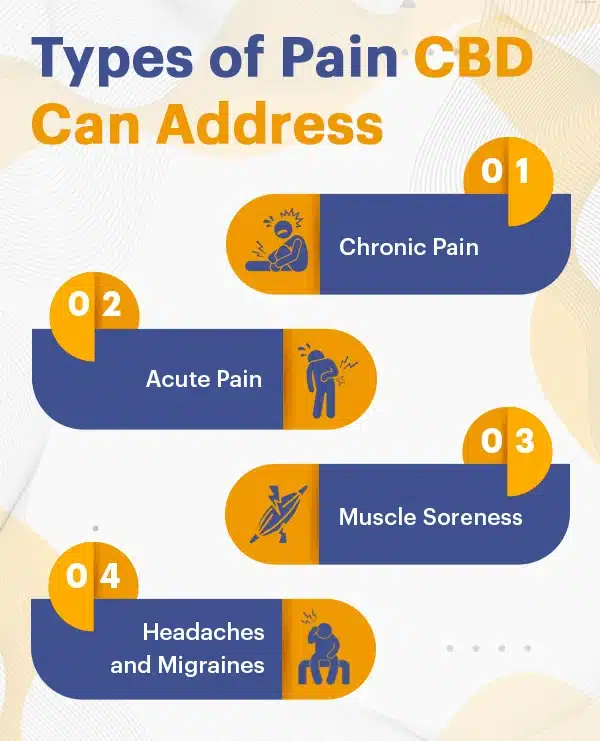
Pain is a universal human experience, and for many, it’s a constant companion. Whether you’re dealing with chronic conditions, occasional discomfort, or post-workout soreness, finding effective pain management solutions is crucial. While over-the-counter medications and prescription drugs are commonly used, there’s a natural alternative that’s been gaining recognition for its potential to alleviate pain: CBD. In this comprehensive guide, we’ll explore the world of CBD for pain management. From understanding how CBD works in the body to its various applications for different types of pain, you’ll discover why many individuals are turning to CBD as their natural relief solution.
The Science of CBD
CBD, short for cannabidiol, is a prominent compound naturally occurring in the cannabis plant. Unlike its counterpart, THC (tetrahydrocannabinol), CBD doesn’t induce the psychoactive “high” commonly associated with marijuana use. Instead, it engages with the body’s endocannabinoid system (ECS), a sophisticated network comprising receptors and neurotransmitters that play a pivotal role in regulating various physiological processes, with pain perception being a key component.
- The Endocannabinoid System (ECS): The ECS is a dynamic and intricate biological system in all vertebrate species, including humans. It encompasses three primary components: endocannabinoids (the body’s natural cannabinoids), receptors, and enzymes. These elements work in harmony to maintain balance and homeostasis within the body.
- Receptor Engagement: CBD interacts primarily with two cannabinoid receptors within the ECS: CB1 and CB2 receptors. CB1 receptors are predominantly found in the central nervous system, while CB2 receptors are primarily in the peripheral nervous system and immune cells. CBD’s interaction with these receptors contributes to its potential therapeutic effects.
- Modulation of Pain Perception: One of the notable roles of the ECS is its involvement in modulating pain perception. When the body experiences pain, endocannabinoids are synthesized and bind to cannabinoid receptors. This process can help regulate the intensity of pain signals sent to the brain, potentially alleviating discomfort.
- Anti-Inflammatory Properties: CBD is also recognized for its anti-inflammatory properties, which can be integral in pain management. Inflammation is a common contributor to pain, and by reducing inflammation, CBD may indirectly mitigate pain symptoms.
- Neurotransmitter Regulation: CBD’s impact extends beyond the ECS, influencing various neurotransmitters in the brain. For instance, it may affect serotonin receptors, which affect mood regulation and pain perception. By modulating these receptors, CBD may improve mood and pain relief.
- Non-Psychoactive Nature: Importantly, CBD does not produce the psychoactive effects associated with THC. This feature ensures individuals can harness its potential therapeutic benefits without experiencing cognitive impairment.
- Holistic Potential: CBD’s multifaceted interactions within the ECS and broader physiological systems make it a promising candidate for addressing various health challenges, including pain management.
How CBD Works for Pain Relief
When you consume CBD, it interacts with the ECS, influencing its receptors’ activity. The ECS has two primary types of receptors relevant to pain management: CB1 receptors, which are mainly located in the central nervous system, and CB2 receptors, primarily found in the peripheral nervous system and immune cells.
CBD’s interaction with these receptors can have several pain-relieving effects:

- Reducing Inflammation: Inflammation is a common source of pain in various conditions, from arthritis to muscle strains. CBD’s anti-inflammatory properties can help alleviate this underlying cause of pain.
- Altering Pain Signaling: CBD can modulate the transmission of pain signals in the nervous system. By reducing pain signalling, it can lead to a reduced perception of pain.
- Enhancing Endorphin Release: CBD may stimulate the release of endorphins, the body’s natural painkillers, promoting an overall sense of well-being and pain relief.
- Promoting Relaxation: Pain often leads to muscle tension, which can exacerbate discomfort. CBD’s muscle relaxant properties can ease this tension, providing relief.
Types of Pain CBD Can Address
CBD’s potential for pain relief extends to various types of pain, including:

- Chronic Pain: Conditions like arthritis, fibromyalgia, and neuropathy often involve persistent pain. CBD’s anti-inflammatory and pain-modulating effects can offer relief for individuals dealing with chronic pain.
- Acute Pain: Whether it’s post-surgery recovery or injury-related pain, CBD can help manage acute pain episodes, reducing the need for potentially addictive painkillers.
- Muscle Soreness: Athletes and fitness enthusiasts can benefit from CBD’s muscle relaxant properties, which can alleviate post-exercise soreness and aid in faster recovery.
- Headaches and Migraines: CBD’s ability to reduce inflammation and alter pain signalling may also make it an effective option for those dealing with headaches and migraines.
Choosing the Right CBD Product
Not all CBD products are created equal, and choosing the right one for pain management is crucial. You’ll find a variety of options, including CBD oils, capsules, topicals, and edibles. Each has its advantages, and the choice depends on your preferences and the type of pain you’re addressing.
In the following sections, we’ll delve deeper into each type of pain CBD can address and provide practical tips for selecting the right CBD product and determining the appropriate dosage. We’ll also explore potential side effects and safety considerations to ensure you can harness the power of CBD for pain management effectively and confidently.
Understanding Chronic Pain and CBD’s Role
Chronic pain is a pervasive and challenging condition that affects millions of individuals worldwide. Whether stemming from arthritis, neuropathy, or other underlying health conditions, chronic pain can significantly diminish one’s quality of life. Fortunately, CBD has emerged as a potential natural remedy for effectively managing chronic pain.
- Chronic Pain Types: Chronic pain encompasses various forms, each with its unique challenges. Conditions such as arthritis, neuropathic pain, and fibromyalgia can lead to persistent discomfort and reduced mobility. CBD’s potential as a natural anti-inflammatory and analgesic agent makes it an appealing option for those seeking relief from chronic pain.
- Holistic Pain Management: CBD interacts with the endocannabinoid system (ECS), which regulates pain perception and inflammation. By engaging with ECS receptors, CBD may help modulate pain signals and reduce inflammation, offering a holistic approach to pain management.
- Non-Psychoactive Relief: One crucial distinction to note is that CBD is non-psychoactive, meaning it does not induce the “high” associated with its counterpart, THC. This characteristic makes CBD a safe and accessible option for individuals seeking pain relief without cognitive impairment.
Acute Pain Relief with CBD: Post-Surgery and Injuries
Managing acute pain, such as post-surgery discomfort or injury-related pain, often necessitates immediate relief. While prescription painkillers are commonly prescribed for these situations, they come with the risk of addiction and adverse side effects. CBD offers a promising alternative for acute pain management, providing relief without these drawbacks.
- Immediate Relief: CBD’s ability to interact with pain receptors in the brain and reduce inflammation may make it an effective option for addressing acute pain. It can be administered in various forms, such as tinctures, topical creams, or capsules, allowing for flexibility in usage.
- Reduced Dependency: Unlike opioids and other prescription pain medications, CBD does not carry the same risk of addiction or dependence. This makes it a safer choice for those requiring short-term pain relief.
- Minimal Side Effects: While some individuals may experience mild side effects like dry mouth or drowsiness, CBD’s overall side effect profile is more favorable than traditional painkillers.
Recovery and Muscle Soreness: CBD for Athletes
Athletes and fitness enthusiasts often grapple with muscle soreness after intense workouts. While sore muscles can indicate progress, they can hinder performance and recovery. CBD’s muscle-relaxing properties can aid athletes in bouncing back faster, facilitating more productive training sessions and reducing downtime.
- Reduced Inflammation: Intense exercise can lead to micro-tears in muscle fibres, resulting in inflammation and soreness. CBD’s anti-inflammatory properties can help reduce this inflammation, potentially alleviating discomfort and expediting healing.
- Improved Sleep: Quality sleep is crucial for recovery. CBD’s potential to promote better sleep patterns may benefit athletes by enhancing their restorative rest and overall performance.
Headaches and Migraines: A Natural Solution with CBD
Headaches and migraines can be debilitating, significantly impacting daily life and productivity. While over-the-counter pain relievers are often the go-to solution, frequent use can lead to medication overuse headaches. CBD offers a natural alternative that may effectively alleviate headache and migraine symptoms without the risk of medication dependence.
- Pain Modulation: CBD’s interaction with the endocannabinoid system may influence pain perception and relieve headaches and migraines. It can potentially help regulate serotonin levels, which play a role in migraine attacks.
- Non-Habit Forming: Unlike some conventional headache medications that carry the risk of habit formation, CBD is non-addictive, making it a safer choice for long-term use.
Read More: The Science of Serenity: CBD for Stress and Anxiety Management
Determining the Right CBD Dosage for Pain
When it comes to finding the optimal CBD dosage for pain management, it often involves a bit of trial and error. Several factors can influence the appropriate CBD dose, including your body weight, metabolism, and the severity of your pain. Here are some steps to consider when determining the right dosage:
- Start Low: It’s generally recommended to begin with a low CBD dose, especially if you’re new to CBD. Starting low allows your body to adjust to the compound and helps you gauge your sensitivity to it.
- Gradual Increase: After starting with a low dose, gradually increase it over time until you achieve the desired level of pain relief. Incremental adjustments can help you find the sweet spot where CBD is most effective.
- Observe Effects: Consider how your body responds to different CBD doses. Keep a journal to track changes in your pain levels, mood, and overall well-being as you adjust the dosage.
- Consult with a Professional: If you’re uncertain about the right CBD dosage or taking other medications, it’s crucial to consult with a healthcare professional. They can provide personalized guidance based on your specific health conditions and needs.
Conclusion
CBD’s role in pain management represents a promising natural solution for various types of pain, from chronic conditions to acute injuries and everyday discomfort. By understanding how CBD works in the body and selecting the right product and dosage, you can harness the potential of this compound to find relief and improve your quality of life. As with any health-related decision, it’s essential to consult with a healthcare provider for personalized guidance and ensure that CBD is a safe and suitable option for your pain management needs.



